瑞舒伐他汀钙EP分析方法25-03
- 格式:pdf
- 大小:162.77 KB
- 文档页数:7

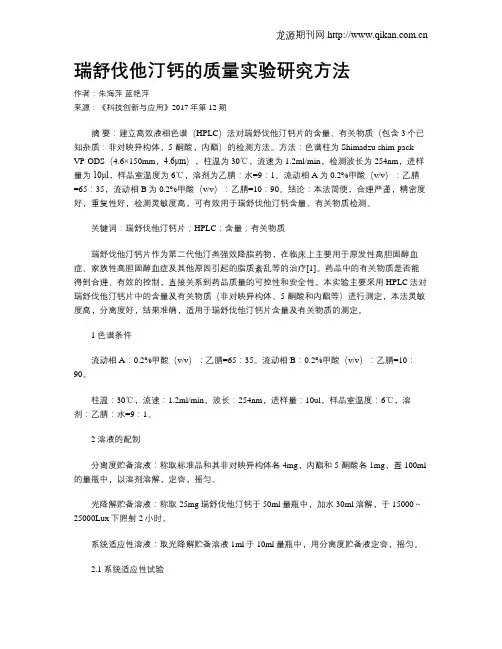
瑞舒伐他汀钙的质量实验研究方法作者:朱海萍蓝艳萍来源:《科技创新与应用》2017年第12期摘要:建立高效液相色谱(HPLC)法对瑞舒伐他汀钙片的含量、有关物质(包含3个已知杂质:非对映异构体,5-酮酸,内酯)的检测方法。
方法:色谱柱为Shimadzu shim-pack VP-ODS(4.6×150mm,4.6μm),柱温为30℃,流速为1.2ml/min,检测波长为254nm,进样量为10μl,样品室温度为6℃,溶剂为乙腈:水=9:1。
流动相A为0.2%甲酸(v/v):乙腈=65:35,流动相B为0.2%甲酸(v/v):乙腈=10:90。
结论:本法简便,合理严谨,精密度好,重复性好,检测灵敏度高,可有效用于瑞舒伐他汀钙含量、有关物质检测。
关键词:瑞舒伐他汀钙片;HPLC;含量;有关物质瑞舒伐他汀钙片作为第二代他汀类强效降脂药物,在临床上主要用于原发性高胆固醇血症、家族性高胆固醇血症及其他原因引起的脂质紊乱等的治疗[1]。
药品中的有关物质是否能得到合理、有效的控制,直接关系到药品质量的可控性和安全性。
本实验主要采用HPLC法对瑞舒伐他汀钙片中的含量及有关物质(非对映异构体、5-酮酸和内酯等)进行测定,本法灵敏度高,分离度好,结果准确,适用于瑞舒伐他汀钙片含量及有关物质的测定。
1 色谱条件流动相A:0.2%甲酸(v/v):乙腈=65:35。
流动相B:0.2%甲酸(v/v):乙腈=10:90。
柱温:30℃,流速:1.2ml/min,波长:254nm,进样量:10ul,样品室温度:6℃,溶剂:乙腈:水=9:1。
2 溶液的配制分离度贮备溶液:称取标准品和其非对映异构体各4mg,内酯和5-酮酸各1mg,置100ml 的量瓶中,以溶剂溶解,定容,摇匀。
光降解贮备溶液:称取25mg瑞舒伐他汀钙于50ml量瓶中,加水30ml溶解,于15000~25000Lux下照射2小时。
系统适应性溶液:取光降解贮备溶液1ml于10ml量瓶中,用分离度贮备液定容,摇匀。
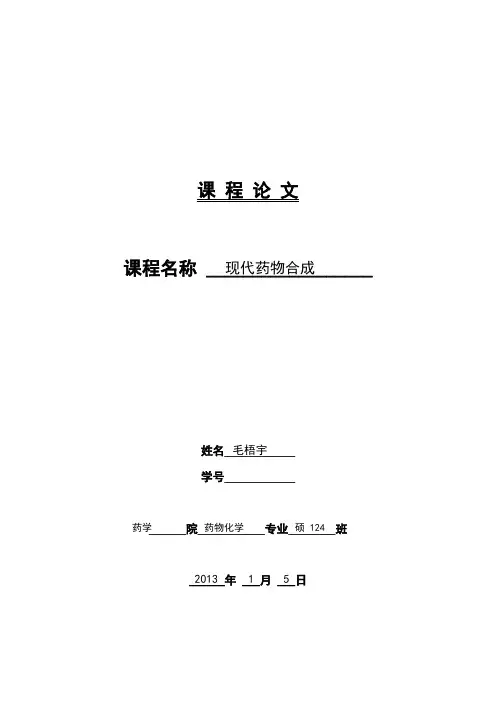
课 程 论 文课程名称 __________________姓名_____________________学号________________________________院____________________专业______________班______年 ___月 ___日现代药物合成 毛梧宇药学 药物化学 硕 124 2013 1 5瑞舒伐他汀结构式:通用名:Rosuvastatin calcium瑞舒伐他汀钙化学名:(+)-(3R,5S)-双{7-[4-(4-氟苯基)-6-异丙基-2-(N-甲基-N-甲磺酰胺基)嘧啶-5-基]-3,5-二羟基-6-(E)-庚烯酸}半钙盐商品名:可定 (Crestor)开发商:日本盐野义制药株式会社在上世纪80年代末研制开发、筛选,之后,英国AstraZeneca公司在除日本等东亚国家之外的世界范围内再次开发得到的。
上市时间:2003年2月,2006年中国上市上市国家与地区:英国美国加拿大中国等六十余个国家与地区适应症:1、高脂血症和高胆固醇血症。
2、用于无心脏病临床表现但潜在心血管疾病风险的患者,以减少心肌梗塞、中风和进行冠状动脉血管再造的风险。
3.也适用于纯合子家族性高胆固醇血症的患者,作为饮食控制和其它降脂措施(如LDL去除疗法)的辅助治疗,或在这些方法不适用时使用。
作用机制:是一种选择性HMG-CoA还原酶抑制剂。
HMG-CoA还原酶抑制剂是转变3-羟基-3-甲基戊二酰辅酶A为甲戊酸盐—胆固醇的前体—的限速酶。
瑞舒伐他汀的主要作用部位是肝—降低胆固醇的靶向器官。
瑞舒伐他汀增加了肝LDL细胞表面受体数目,促进LDL的吸收和分解代谢,抑制了VLDL的肝合成,由此降低VLDL和LDL微粒的总数。
对于纯合子与杂合子家族性高胆固醇血症患者、非家族性高胆固醇血症患者、混合型血脂异常患者、瑞舒伐他汀能降低总胆固醇、LDL-C、ApoB、非HDL-C水平。
瑞舒伐他汀也能降低TG、升高HDL-C水平。
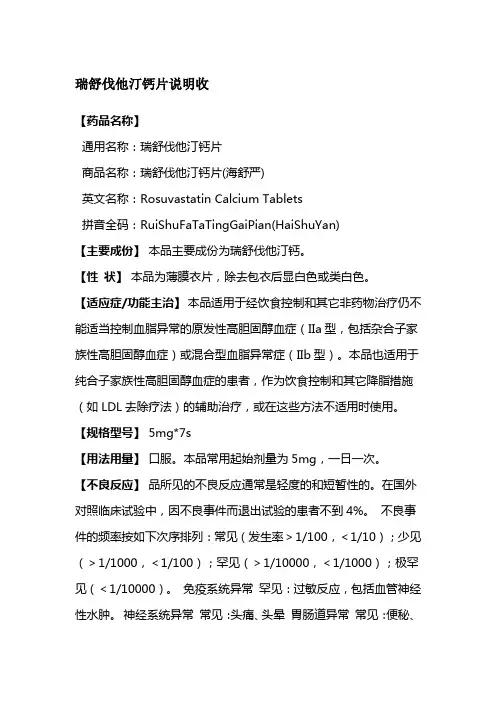
瑞舒伐他汀钙片说明收【药品名称】通用名称:瑞舒伐他汀钙片商品名称:瑞舒伐他汀钙片(海舒严)英文名称:Rosuvastatin Calcium Tablets拼音全码:RuiShuFaTaTingGaiPian(HaiShuYan)【主要成份】本品主要成份为瑞舒伐他汀钙。
【性状】本品为薄膜衣片,除去包衣后显白色或类白色。
【适应症/功能主治】本品适用于经饮食控制和其它非药物治疗仍不能适当控制血脂异常的原发性高胆固醇血症(IIa型,包括杂合子家族性高胆固醇血症)或混合型血脂异常症(IIb型)。
本品也适用于纯合子家族性高胆固醇血症的患者,作为饮食控制和其它降脂措施(如LDL去除疗法)的辅助治疗,或在这些方法不适用时使用。
【规格型号】 5mg*7s【用法用量】口服。
本品常用起始剂量为5mg,一日一次。
【不良反应】品所见的不良反应通常是轻度的和短暂性的。
在国外对照临床试验中,因不良事件而退出试验的患者不到4%。
不良事件的频率按如下次序排列:常见(发生率>1/100,<1/10);少见(>1/1000,<1/100);罕见(>1/10000,<1/1000);极罕见(<1/10000)。
免疫系统异常罕见:过敏反应,包括血管神经性水肿。
神经系统异常常见:头痛、头晕胃肠道异常常见:便秘、恶心、腹痛皮肤和皮下组织异常少见:瘙痒、皮疹和荨麻疹骨骼肌、关节和骨骼异常常见:肌痛罕见:肌病和横纹肌溶解全身异常常见:无力同其它HMG-CoA还原酶抑制剂一样,本品的不良反应发生率有随剂量增加而增加的趋势。
对肾脏的影响:在接受本品的患者中观察到蛋白尿(试纸法检测),蛋白大多数来源于肾小管。
约1%的患者在10mg和20mg治疗期间的某些时段,蛋白尿从无或微量升高至++或更多,在接受40mg治疗的患者中,这个比例约为3%。
在20mg剂量治疗中,观察到蛋白尿从无或微量升高至+的轻度升高。
在大多数病例,继续治疗后蛋白尿自动减少或消失。
【禁忌】本品禁用于:1.对瑞舒伐他汀或本品中任何成份过敏者。

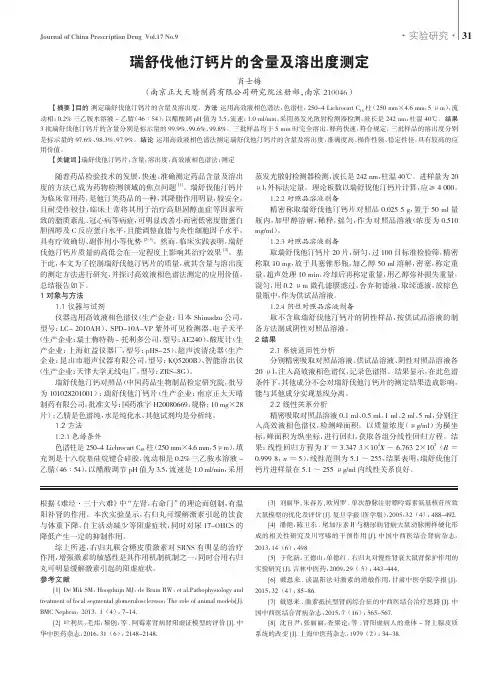
31 Journal of China Prescription Drug Vol.17 No.9·实验研究·随着药品检验技术的发展,快速、准确测定药品含量及溶出度的方法已成为药物检测领域的焦点问题[1]。
瑞舒伐他汀钙片为临床常用药,是他汀类药品的一种,其降脂作用明显,较安全,且耐受性较佳,临床上常将其用于治疗高胆固醇血症等因素所致的脂质紊乱、冠心病等病症,可明显改善小而密低密度脂蛋白胆固醇及C反应蛋白水平,且能调整血脂与炎性细胞因子水平,具有疗效确切、副作用小等优势[2-3]。
然而,临床实践表明,瑞舒伐他汀钙片质量的高低会在一定程度上影响其治疗效果[4]。
基于此,本文为了控制瑞舒伐他汀钙片的质量,就其含量与溶出度的测定方法进行研究,并探讨高效液相色谱法测定的应用价值,总结报告如下。
1 对象与方法1.1 仪器与试剂仪器选用高效液相色谱仪(生产企业:日本Shimadzu公司,型号:LC- 2010AH)、 SPD-10A-VP紫外可见检测器、电子天平(生产企业:瑞士梅特勒- 托利多公司,型号:AE240)、酸度计(生产企业:上海虹益仪器厂,型号:pHS-25)、超声波清洗器(生产企业:昆山市超声仪器有限公司,型号:KQ5200B)、智能溶出仪(生产企业:天津大学无线电厂,型号:ZRS-8G)。
瑞舒伐他汀钙对照品(中国药品生物制品检定研究院,批号为101028201001);瑞舒伐他汀钙片(生产企业:南京正大天晴制药有限公司,批准文号:国药准字H20080669,规格:10 mg×28片);乙腈是色谱纯,水是纯化水,其他试剂均是分析纯。
1.2 方法1.2.1 色谱条件色谱柱是250-4 Lichrocart C18柱(250 mm×4.6 mm,5μm),填充剂是十八烷基硅烷键合硅胶,流动相是0.2%三乙胺水溶液-乙腈(46∶54),以醋酸调节pH值为3.5,流速是1.0 ml/min,采用蒸发光散射检测器检测,波长是242 nm,柱温40℃。
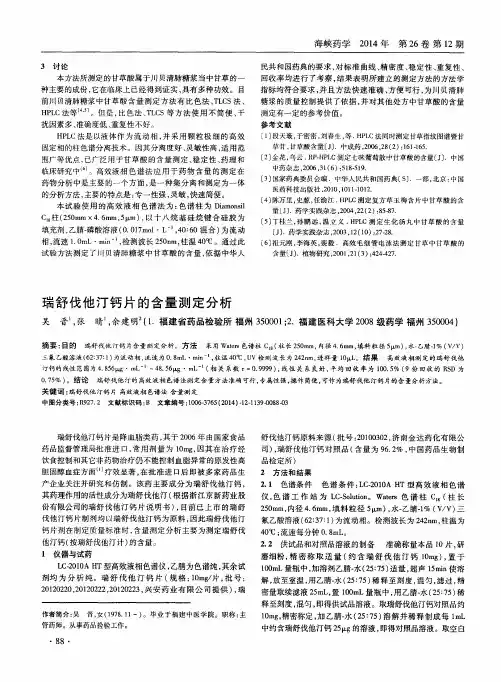
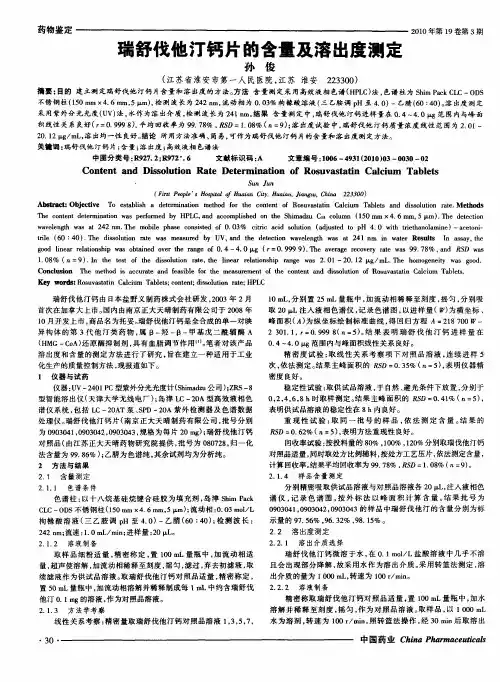
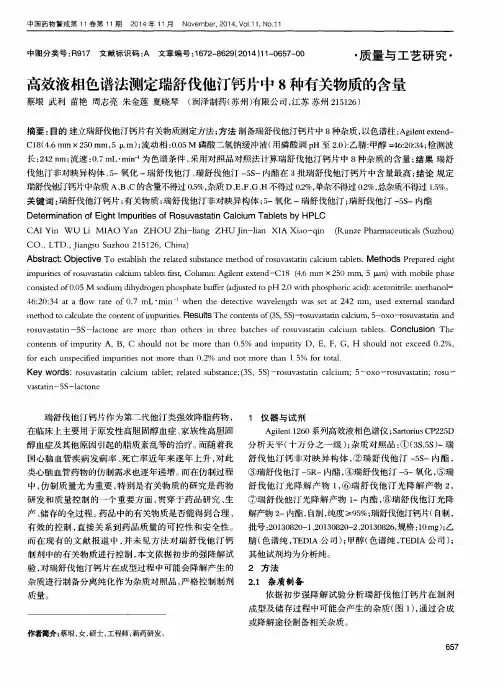
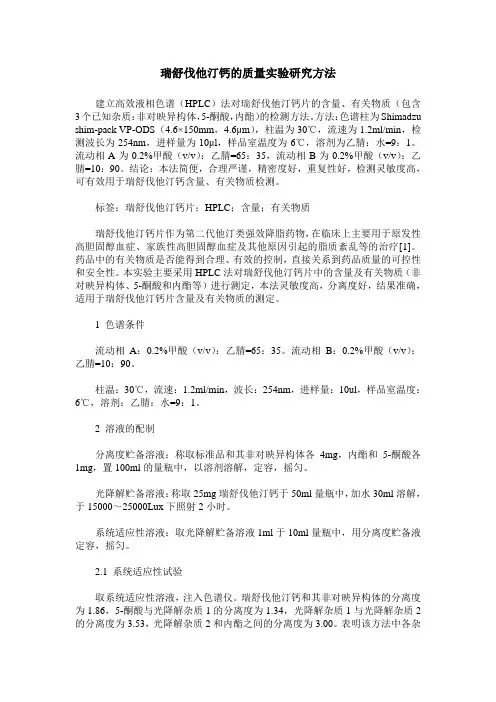
瑞舒伐他汀钙的质量实验研究方法建立高效液相色谱(HPLC)法对瑞舒伐他汀钙片的含量、有关物质(包含3个已知杂质:非对映异构体,5-酮酸,内酯)的检测方法。
方法:色谱柱为Shimadzu shim-pack VP-ODS(4.6×150mm,4.6μm),柱温为30℃,流速为1.2ml/min,检测波长为254nm,进样量为10μl,样品室温度为6℃,溶剂为乙腈:水=9:1。
流动相A为0.2%甲酸(v/v):乙腈=65:35,流动相B为0.2%甲酸(v/v):乙腈=10:90。
结论:本法简便,合理严谨,精密度好,重复性好,检测灵敏度高,可有效用于瑞舒伐他汀钙含量、有关物质检测。
标签:瑞舒伐他汀钙片;HPLC;含量;有关物质瑞舒伐他汀钙片作为第二代他汀类强效降脂药物,在临床上主要用于原发性高胆固醇血症、家族性高胆固醇血症及其他原因引起的脂质紊乱等的治疗[1]。
药品中的有关物质是否能得到合理、有效的控制,直接关系到药品质量的可控性和安全性。
本实验主要采用HPLC法对瑞舒伐他汀钙片中的含量及有关物质(非对映异构体、5-酮酸和内酯等)进行测定,本法灵敏度高,分离度好,结果准确,适用于瑞舒伐他汀钙片含量及有关物质的测定。
1 色谱条件流动相A:0.2%甲酸(v/v):乙腈=65:35。
流动相B:0.2%甲酸(v/v):乙腈=10:90。
柱温:30℃,流速:1.2ml/min,波长:254nm,进样量:10ul,样品室温度:6℃,溶剂:乙腈:水=9:1。
2 溶液的配制分离度贮备溶液:称取标准品和其非对映异构体各4mg,内酯和5-酮酸各1mg,置100ml的量瓶中,以溶剂溶解,定容,摇匀。
光降解贮备溶液:称取25mg瑞舒伐他汀钙于50ml量瓶中,加水30ml溶解,于15000~25000Lux下照射2小时。
系统适应性溶液:取光降解贮备溶液1ml于10ml量瓶中,用分离度贮备液定容,摇匀。
2.1 系统适应性试验取系统适应性溶液,注入色谱仪。
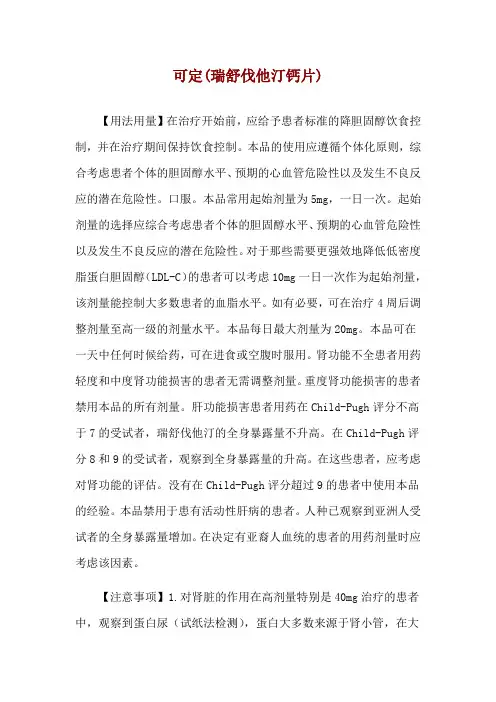
可定(瑞舒伐他汀钙片)【用法用量】在治疗开始前,应给予患者标准的降胆固醇饮食控制,并在治疗期间保持饮食控制。
本品的使用应遵循个体化原则,综合考虑患者个体的胆固醇水平、预期的心血管危险性以及发生不良反应的潜在危险性。
口服。
本品常用起始剂量为5mg,一日一次。
起始剂量的选择应综合考虑患者个体的胆固醇水平、预期的心血管危险性以及发生不良反应的潜在危险性。
对于那些需要更强效地降低低密度脂蛋白胆固醇(LDL-C)的患者可以考虑10mg一日一次作为起始剂量,该剂量能控制大多数患者的血脂水平。
如有必要,可在治疗4周后调整剂量至高一级的剂量水平。
本品每日最大剂量为20mg。
本品可在一天中任何时候给药,可在进食或空腹时服用。
肾功能不全患者用药轻度和中度肾功能损害的患者无需调整剂量。
重度肾功能损害的患者禁用本品的所有剂量。
肝功能损害患者用药在Child-Pugh评分不高于7的受试者,瑞舒伐他汀的全身暴露量不升高。
在Child-Pugh评分8和9的受试者,观察到全身暴露量的升高。
在这些患者,应考虑对肾功能的评估。
没有在Child-Pugh评分超过9的患者中使用本品的经验。
本品禁用于患有活动性肝病的患者。
人种已观察到亚洲人受试者的全身暴露量增加。
在决定有亚裔人血统的患者的用药剂量时应考虑该因素。
【注意事项】1.对肾脏的作用在高剂量特别是40mg治疗的患者中,观察到蛋白尿(试纸法检测),蛋白大多数来源于肾小管,在大多数病例,蛋白尿是短暂的或断断续续的。
2.对骨骼肌的作用在接受本品各种剂量治疗的患者中均有对骨骼肌产生影响的报道,如肌痛、肌病,以及罕见的横纹肌溶解,特别是在使用剂量大于20mg的患者中。
肌酸激酶检测不应在剧烈运动后或存在引起CK升高的似是而非的因素时检测肌酸激酶(CK),这样会混淆对结果的解释。
若CK基础值明显升高(>5×ULN),应在5-7天内再进行检测确认。
若重复检测确认患者CK基础值>5×ULN,则不可以开始治疗。
瑞舒伐他汀钙片的含量及溶出度测定孙俊【摘要】目的建立测定瑞舒伐他汀钙片含量和溶出度的方法.方法含量测定采用高效液相色谱(HPLC)法,色谱柱为Shim Pack CLC-ODS不锈钢柱(150 mm×4.6 mm,5μm),检测波长为242 nm,流动相为0.03%枸橼酸溶液(三乙胺调pH至4.0)-乙腈(60:40).溶出度测定采用紫外分光光度(UV)法,水作为溶出介质,检测波长为241 nm.结果含量测定中,瑞舒伐他汀钙进样量在0.4~4.0 μg范围内与峰面积线性关系良好(r=0.999 8).平均回收率为99.78%,RSD=1.08%(n=9);溶出度试验中,瑞舒伐他汀钙质量浓度线性范围为2.01~20.12 μg/mL,溶出均一性良好.结论所用方法准确、简易,可作为瑞舒伐他汀钙片的含量和溶出度测定方法.【期刊名称】《中国药业》【年(卷),期】2010(019)003【总页数】2页(P30-31)【关键词】瑞舒伐他汀钙片;含量;溶出度;高效液相色谱法【作者】孙俊【作者单位】江苏省淮安市第一人民医院,江苏,淮安,223300【正文语种】中文【中图分类】R927.2;R972+.6瑞舒伐他汀钙由日本盐野义制药株式会社研发,2003年2月首次在加拿大上市。
国内由南京正大天晴制药有限公司于2008年10月开发上市,商品名为托妥。
瑞舒伐他汀钙是全合成的单一对映异构体的第3代他汀类药物,属"-羟-"-甲基戊二酰辅酶A(HMG-CoA)还原酶抑制剂,具有血脂调节作用[1]。
笔者对该产品溶出度和含量的测定方法进行了研究,旨在建立一种适用于工业化生产的质量控制方法,现报道如下。
1 仪器与试药仪器:UV-2401 PC型紫外分光光度计(Shimadzu公司);ZRS-8型智能溶出仪(天津大学无线电厂);岛津LC-20A型高效液相色谱仪系统,包括LC-20AT 泵、SPD-20A紫外检测器及色谱数据处理仪。
关于瑞舒伐他汀钙口腔崩解片的制备及溶出度测定方法下文为大家整理带来的关于瑞舒伐他汀钙口腔崩解片的制备及溶出度测定方法,希望内容对您有帮助,感谢您得阅读。
瑞舒伐他汀钙是新一代HMG-COA还原酶抑制剂,较其他同类药物显示出更好的调脂效果,并能逆转动脉粥样硬化的进程,促使斑块消退,减少心血管事件发生率和死亡率,被医药界誉为超级他汀。
目前在国内上市的瑞舒伐他汀钙有片剂和胶囊剂,为满足患者需求,本课题组研制了瑞舒伐他汀钙口腔崩解片并对其处方组成进行了优化,本文对瑞舒伐他汀钙口崩片制备工艺研究过程报告如下。
1仪器与试药1.1仪器T6新世纪-紫外可见分光光度计(北京普析通用仪器有限责任公司),ZRS-8G溶出试验仪(天津大学无线电厂),电子天平(上海浦春计量有限公司),DP30A单冲压片机(北京国药龙立科技有限公司);YD-1片剂硬度仪(天津鑫州科技有限公司),DHG-9053A型电热恒温鼓风干燥箱(上海一恒科技有限公司)。
1.2试药瑞舒伐他汀钙对照品(中国药品生物制品检定所,批号:101028-202001),瑞舒伐他汀钙原料药(南京正大天晴制药有限公司,批号:20201013,纯度98.0%),瑞舒伐他汀钙口腔崩解片(自制,批号:20200528、20200529、20200530),交联聚维酮(北京风礼商贸有限责任公司),乳糖(天津市化学试剂一厂),甘露醇(北京索莱宝科技有限公司),阿斯巴甜(广州市芬美源生物科技有限公司),甜菊糖(杭州普修生物科技有限公司),薄荷脑,香橙香精(上海华宝孔雀香精香料有限公司),硬脂酸镁(天津市永昌盛化工有限公司)。
2方法与结果2.1口腔崩解片制备工艺参数的确定依照处方称取主药及辅料,混合均匀后加粘合剂制软材,过筛制得湿颗粒,干燥得干颗粒,整粒,6mm浅凹冲压片,整个过程避光操作。
2.1.1原料药的处理:瑞舒伐他汀钙原料过80目、120目筛,与辅料混合均匀后制粒、干燥、整粒、加入外加辅料混合后压片,测定瑞舒伐他汀钙口崩片15min溶出量。
·论著·34中国处方药 第12卷 第2期员对于高危药品认识不足或者安全用药意识薄弱等,在药物储存管理中,常存在药品放置不规范,将高危药品与普通药品混放而导致取药错误等,诱发安全隐患[6]。
对于高危药品的种类、常用规格、正确用法、用量以及病情观察要点等认识不清,也容易发生用药安全隐患事件。
医嘱字迹潦草,部分护理人员不易辨认导致转录、执行错误,或者重新与医生沟通确认延误医嘱处理时间等,均可能引发用药安全隐患事件,导致医患纠纷等[7]。
为提高临床高危药品管理质量、确保医疗安全,本研究参照国内医疗机构高危药品管理经验以及策略,结合医院具体情况,选派具有高级职称的药师参与高危药品管理,对高危药品管理、使用行为进行全面监督和指导,并对医护人员开展高危药品理论知识以及应用实践技术进行培训、考核。
同时,通过建立完善的管理制度、药品存放及标志制度、使用人员权限控制、用药安全性论证、处方审核及调整、药品调配及方法均落实双人复核制度,定期开展药师与医护人员、患者的沟通与教育以及不良事件监测,同时定期进行总结反馈等,有效促进了临床高危药品管理质量的提高以及合理应用[8]。
研究结果显示,2013年全院高危药品管理缺陷及用药安全隐患占总体药物管理缺陷及安全隐患事件的13.33%和15.15%,较2012年的33.33%和26.92%显著降低。
同时,全院医护人员高危药品知识考评得分较2012年显著提高。
综上所述,药师介入病区高危药品管理,完善并落实高危药品监督管理体系,强化高危药品理论知识、实践操作技能培训以及安全应用意识教育,对于确保用药安全准确、降低用药不良事件发生率等具有重要意义。
参考文献[1] 孙世光,李秀敏,闫荟,等. 高危药品管理方法探讨.中国基层医药,2009,16(9):1705.[2] 孙世光,李秀敏,崔杰,等. 医院高危药品管理模式研究.药学服务与研究,2010,10(4):256-259.[3] 蔡晓宇. 病区高危药品管理中的问题及对策.中国药业,2011,20(24):70-71.[4] 陈芳. 高危药品管理制度改革在我院住院病区实施情况分析.医药前沿,2013,(33):381-382.[5] 窦琴,德琳. 高危药品管理的实践.中国护理管理 ,2013,12(s1):92-93.[6] 戴盛玲.病区高危药品管理中存在的问题及对策探讨.亚太传统医药,2012,8(11):221-222.[7] 许金美,卜玲珍,姚志芳,等.持续质量改进在病区高危药品管理中的应用.中医药管理杂志,2011,19(1):81-82.[8] 汤景霞.药房高危药品管理与用药安全.中国现代药物应用,2013,7(20):252-253.瑞舒伐他汀钙片是一种选择性HMG-CoA还原酶抑制剂,对动脉粥样斑块有逆转作用,是防治冠心病常用药[1-4]。
HPLC测定瑞舒伐他汀钙片的含量及溶出度
魏碧凤
【期刊名称】《海峡药学》
【年(卷),期】2012(024)010
【摘要】目的建立高效液相色谱法测定瑞舒伐他汀钙片的含量及溶出度的方法.方法色谱柱为250-4 lichrocart C18柱,流动相为0.2%三乙胺水溶液-乙腈(46∶54),流速为1.0mL·min-1;检测波长为242nm,柱温40℃.结果瑞舒伐他汀钙浓度在5.1~255μg·mL-1范围内呈良好的线性关系,平均回收率 99.3%,RSD为0.65%.结论所建立的方法精密度、稳定性及重复性良好,可用于瑞舒伐他汀钙片含量及溶出度的测定.
【总页数】3页(P88-90)
【作者】魏碧凤
【作者单位】福建医科大学附属第二医院药剂科,泉州,362000
【正文语种】中文
【中图分类】R927.2
【相关文献】
1.芬特明片剂含量以及溶出度样品含量的反相HPLC 测定 [J], 彭波;郝杰;刘辽;杨云霞
2.HPLC法测定瑞舒伐他汀钙片的含量 [J], 江莉;史道华;楼永明;庄波阳
3.瑞舒伐他汀钙片的含量及溶出度测定 [J], 孙俊
4.HPLC测定复方头孢克洛胶囊含量、含量均匀度及溶出度的研究 [J], 张琼;杨利
红;苏蕊
5.瑞舒伐他汀钙片的含量及溶出度测定 [J], 肖士梅
因版权原因,仅展示原文概要,查看原文内容请购买。
Reference:PA/PH/Exp.P4/T (11)36ANP XXXX:2631ROSUVASTATIN CALCIUMRosuvastatinum calcicumC 44H 54CaF 2N 6O 12S 2M r 1001[147098-20-2]DEFINITION Calcium bis[(3R ,5S ,6E )-7-[4-(4-fluorophenyl)-2-[methyl(methylsulfonyl)amino]-6-(propan-2-yl)pyrimidin-5-yl]-3,5-dihydroxyhept-6-enoate].Content :97.0per cent to 102.0per cent (anhydrous substance).CHARACTERSAppearance :white or almost white,hygroscopic powder.Solubility :slightly soluble in water,freely soluble in methylene chloride,practically insoluble in anhydrous ethanol.IDENTIFICATIONA.Infrared absorption spectrophotometry (2.2.24).Comparison :rosuvastatin calcium CRS .B.Enantiomeric purity (see Tests).Results :the principal peak in the chromatogram obtained with the test solution is similar in retention time to the principal peak in the chromatogram obtained with reference solution (c).C.It gives reaction (b)of calcium (2.3.1).TESTSRelated substances .Liquid chromatography (2.2.29).Carry out the test protected from light.Test solution .Dissolve 35.0mg of the substance to be examined in 12mL of acetonitrile for chromatography R and dilute to 50.0mL with water for chromatography R .Reference solution (a).Dissolve 35.0mg of rosuvastatin calcium CRS in 12mL of acetonitrile for chromatography R and dilute to 50.0mL with water for chromatography R .Reference solution (b).To 1.0mL of the test solution add 24mL of acetonitrile forchromatography R and dilute to 100.0mL with water for chromatography R .To 2.0mL of this solution add 2mL of acetonitrile for chromatography R and dilute to 10.0mL with water for chromatography R .Reference solution (c).In order to prepare impurity B in situ ,dissolve 10mg of the substance to be examined in 10mL of a 1per cent V/V solution of trifluoroacetic acid R in acetonitrile for chromatography R .Stopper and heat at 40°C for 1h.Cool,add 20mL of water forchromatography R and adjust to pH 6-8with a 42g/L solution of sodium hydroxide R .Dilute to 50mL with water for chromatography R .Reference solution (d).Dissolve 5mg of rosuvastatin impurity A CRS in 10mL of acetonitrile forReference solution(e).In order to prepare impurity C in situ,heat0.25g of the substance to be examined at50°C for7days in amber glassware with a porous cover(57).Dissolve50mg in11mL of acetonitrile for chromatography R,add3.0mL of reference solution(c)and1.0mL of reference solution(d).Dilute to50.0mL with water for chromatography R.Column:–size:l=0.15m,Ø=3.0mm;–stationary phase:base-deactivated end-capped octadecylsilyl silica gel for chromatography R (3µm)(58);–temperature:40°C.Mobile phase:–mobile phase A:1per cent V/V solution of trifluoroacetic acid R,acetonitrile for chromatography R,water for chromatography R(1:29:70V/V/V);–mobile phase B:1per cent V/V solution of trifluoroacetic acid R,water for chromatography R, acetonitrile for chromatography R(1:24:75V/V/V);Time (min)Mobile phase A(per cent V/V)Mobile phase B(per cent V/V)0-30100030-50100ĺ600ĺ4050-6060ĺ040ĺ10060-750100Flow rate:0.75mL/min.Detection:spectrophotometer at242nm.Injection:10µL of the test solution and reference solutions(b)and(e).Identification of impurities:use the chromatogram obtained with reference solution(e)to identify the peaks due to impurities A,B and C.Relative retention with reference to rosuvastatin(retention time=about25min):impurity A=about0.9;impurity B=about1.1;impurity C=about1.5.System suitability:reference solution(e):–resolution:minimum2.0between the peaks due to rosuvastatin and impurity B.Calculation of percentage contents:–correction factor:multiply the peak area of impurity C by2.1;–for each impurity,use the concentration of rosuvastatin in reference solution(b).Limits:–impurity C:maximum0.6per cent;–impurity B:maximum0.5per cent;–impurity A:maximum0.2per cent;–unspecified impurities:for each impurity,maximum0.10per cent;–total:maximum1.2per cent;–reporting threshold:0.05per cent.(57)Place a small vial containing the substance inside a small beaker and then cover the beaker withfilter paper secured with an elastic band.The following chromatogram is shown for information but will not be published in the EuropeanPharmacopoeia.1.impurity A 3.impurity B 5.impurity E7.impurity F2.rosuvastatin 4.impurity C 6.impurity JFigure2631.-1.–Chromatogram for the test for related substances of rosuvastatin calcium: reference solution(e)spiked with impurities E,F and JEnantiomeric purity.Liquid chromatography(2.2.29).Prepare the solutions immediately before use and protect them from light throughout the test.Solvent mixture:acetonitrile for chromatography R,water for chromatography R(25:75V/V). Test solution.Dissolve25.0mg of the substance to be examined in6mL of acetonitrile for chromatography R and dilute to25.0mL with water for chromatography R.Reference solution(a).Dilute1.0mL of the test solution to100.0mL with the solvent mixture. Dilute1.0mL of this solution to10.0mL with the solvent mixture.Reference solution(b).Dissolve5mg of rosuvastatin impurity G CRS in a mixture of12mLof acetonitrile for chromatography R and10mL of water for chromatography R with the aid of ultrasound and dilute to50.0mL with water for chromatography R.Reference solution(c).To25mg of the substance to be examined add1.0mL of reference solution(b),6mL of acetonitrile for chromatography R and dissolve with the aid of ultrasound; dilute to25mL with water for chromatography R.Column:–size:l=0.15m,Ø=4.6mm;–stationary phase:silica gel OJ for chiral separations R(5µm)(59);–temperature:35°C.Mobile phase:acetonitrile for chromatography R,0.1per cent V/V solution of trifluoroaceticacid R(25:75V/V).Flow rate:0.5mL/min.Detection:spectrophotometer at254nm.Injection:10µL of the test solution and reference solutions(a)and(c).Run time:3times the retention time of rosuvastatin.Identification of impurities:use the chromatogram supplied with rosuvastatin impurity G CRS and the chromatogram obtained with reference solution(c)to identify the peak due to impurity G. Relative retention with reference to rosuvastatin(retention time=about25min):impurity G=about 0.9.System suitability:reference solution(c):–resolution:minimum1.5between the peaks due to impurity G and rosuvastatin.Calculation of percentage content:–use the concentration of rosuvastatin in reference solution(a).Limit:–impurity G:maximum0.1per cent.The following chromatogram is shown for information but will not be published in the EuropeanPharmacopoeia.1.impurity G2.rosuvastatinFigure2631.-2.–Chromatogram for the test for enantiomeric purity of rosuvastatin calcium:reference solution(c)Chlorides:maximum0.2per cent.Dissolve0.15g in60mL of water R by heating to boiling while stirring.Add4mL of dilute nitric acid R,allow to cool to room temperature and titrate with0.01M silver nitrate,determining the end-point potentiometrically(2.2.20)using a silver indicator electrode and a silver-silver chloride reference electrode.1.0mL of0.01M silver nitrate is equivalent to0.3545mg of Cl.ASSAYLiquid chromatography(2.2.29)as described in the test for related substances with the following modification.Injection:test solution and reference solution(a).Calculate the percentage content of C44H54CaF2N6O12S2taking into account the assigned contentof rosuvastatin calcium CRS.STORAGEIn an airtight container protected from light at a temperature of2°C to8°C.IMPURITIESSpecified impurities:A,B,C,G.Other detectable impurities(the following substances would,if present at a sufficient level,be detected by one or other of the tests in the monograph.They are limited by the general acceptance criterion for other/unspecified impurities and/or by the general monograph Substances for pharmaceutical use(2034).It is therefore not necessary to identify these impurities for demonstration of compliance.See also5.10.Control of impurities in substances for pharmaceutical use):D,E,F,H,I,J.A.(3R,5S,6E)-7-[4-(4-fluorophenyl)-2-[[(2-hydroxy-2-methylpropyl)sulfonyl](methyl)amino]-6-(propan-2-yl)pyrimidin-5-yl]-3,5-dihydroxyhept-6-enoic acid,B.(3RS,5RS,6E)-7-[4-(4-fluorophenyl)-2-[methyl(methylsulfonyl)amino]-6-(propan-2-yl)pyrimidin-5-yl]-3,5-dihydroxyhept-6-enoic acid,C.(3R,6E)-7-[4-(4-fluorophenyl)-2-[methyl(methylsulfonyl)amino]-6-(propan-2-yl)pyrimidin-5-yl]-D.N-[4-(4-fluorophenyl)-5-[(E)-2-[(2S,4R)-4-hydroxy-6-oxotetrahydro-2H-pyran-2-yl]ethenyl]-6-(propan-2-yl)pyrimidin-2-yl]-N-methylmethanesulfonamide,E.(3R,5S,6E)-7-[4-(4-fluorophenyl)-2-[([2-[4-(4-fluorophenyl)-2-[methyl(methylsulfonyl)amino]-6-(propan-2-yl)pyrimidin-5-yl]-2-hydroxyethyl]sulfonyl)(methyl)amino]-6-(propan-2-yl)pyrimidin-5-yl]-3,5-dihydroxyhept-6-enoic acid,F.1,1-dimethylethyl[(4R,6S)-6-[(E)-2-[4-(4-fluorophenyl)-2-[methyl(methylsulfonyl)amino]-6-(propan-2-yl)pyrimidin-5-yl]ethenyl]-2,2-dimethyl-1,3-dioxan-4-yl]acetate,G.(3S,5R,6E)-7-[4-(4-fluorophenyl)-2-[methyl(methylsulfonyl)amino]-6-(propan-2-yl)pyrimidin-5-yl]-3,5-dihydroxyhept-6-enoic acid,H.(3R,5RS)-5-[8-fluoro-2-[methyl(methylsulfonyl)amino]-4-(propan-2-yl)-5,6-I.(3S,5RS)-5-[8-fluoro-2-[methyl(methylsulfonyl)amino]-4-(propan-2-yl)-5,6-dihydrobenzo[h]quinazolin-6-yl]-3,5-dihydroxypentanoic acid,J.(3R,5S,6E)-7-[4-(4-fluorophenyl)-2-[([(E)-2-[4-(4-fluorophenyl)-2-[methyl(methylsulfon-yl)amino]-6-(propan-2-yl)pyrimidin-5-yl]ethenyl]sulfonyl)(methyl)amino]-6-(propan-2-yl)pyri-midin-5-yl]-3,5-dihydroxyhept-6-enoic acid.。
生效日期:2009.6.30颁发部门:研发中心瑞舒伐他汀钙片技术文件目的:明确瑞舒伐他汀钙片生产技术文件,为该产品制定生产工艺规程、质量标准、检验规程、SOP等生产验证提供依据。
范围:适用于瑞舒伐他汀钙片。
引用文件:SOPC01013“产品技术文件编修订规定”SOPR01001“产品设计和开发管理程序”内容:1. 产品名称及概述:1.1 产品名称:1.1.1 通用名称:瑞舒伐他汀钙片1.1.2 英文名:Rosuvastatin Calcium Tablets1.1.3 主要成分:瑞舒伐他汀钙生效日期:2009.6.30 1.1.4 化学名:双-[(E)-7-[4-(4-氟基苯基)-6-异丙基-2-[甲基(甲磺酰基)氨基]-嘧啶-5-基](3R,5S)-3,5-二羟基庚-6-烯酸]钙盐(2:1)瑞舒伐他汀钙结构式:1.1.5 分子式及分子量:(C22H27FN3O6S)2Ca,分子量:1001.151.2产品理化特性、性状、规格及MSDS文件等1.2.1 产品理化特性、性状、规格瑞舒伐他汀钙原料为白色或类白色粉末,无臭。
在二甲亚砜中易溶,在乙腈或甲醇中略溶,在乙醇或水中微溶。
瑞舒伐他汀钙片为薄膜衣片,除去薄膜衣后显白色或类白色,其规格为5 mg、10mg、20mg,含瑞舒伐他汀应为标示量的90.0%~110.0%。
1.2.2 产品MSDS文件见附件1.3 产品包装:双硬铝包装:规格5mg: 7片/板/盒,7片×2板/盒,14片/板/盒;规格10mg: 7片/板/盒,7片×2板/盒,14片/板/盒;规格20mg: 7片/板/盒,7片×2板/盒,14片/板/盒。
1.4 主要功能和适应症:生效日期:2009.6.30适用于原发性高胆固醇血症(Ⅱa型,包括杂合子家族性高胆固醇血症)或混合型脂质异常血症(Ⅱb型)患者在饮食或锻炼疗法效果不理想时的辅助治疗。
辅助饮食和其他降脂疗法(如LDL去除法)治疗纯合子家族性高胆固醇血症。
Reference:PA/PH/Exp.P4/T (11)36ANP XXXX:2631ROSUVASTATIN CALCIUMRosuvastatinum calcicumC 44H 54CaF 2N 6O 12S 2M r 1001[147098-20-2]DEFINITION Calcium bis[(3R ,5S ,6E )-7-[4-(4-fluorophenyl)-2-[methyl(methylsulfonyl)amino]-6-(propan-2-yl)pyrimidin-5-yl]-3,5-dihydroxyhept-6-enoate].Content :97.0per cent to 102.0per cent (anhydrous substance).CHARACTERSAppearance :white or almost white,hygroscopic powder.Solubility :slightly soluble in water,freely soluble in methylene chloride,practically insoluble in anhydrous ethanol.IDENTIFICATIONA.Infrared absorption spectrophotometry (2.2.24).Comparison :rosuvastatin calcium CRS .B.Enantiomeric purity (see Tests).Results :the principal peak in the chromatogram obtained with the test solution is similar in retention time to the principal peak in the chromatogram obtained with reference solution (c).C.It gives reaction (b)of calcium (2.3.1).TESTSRelated substances .Liquid chromatography (2.2.29).Carry out the test protected from light.Test solution .Dissolve 35.0mg of the substance to be examined in 12mL of acetonitrile for chromatography R and dilute to 50.0mL with water for chromatography R .Reference solution (a).Dissolve 35.0mg of rosuvastatin calcium CRS in 12mL of acetonitrile for chromatography R and dilute to 50.0mL with water for chromatography R .Reference solution (b).To 1.0mL of the test solution add 24mL of acetonitrile forchromatography R and dilute to 100.0mL with water for chromatography R .To 2.0mL of this solution add 2mL of acetonitrile for chromatography R and dilute to 10.0mL with water for chromatography R .Reference solution (c).In order to prepare impurity B in situ ,dissolve 10mg of the substance to be examined in 10mL of a 1per cent V/V solution of trifluoroacetic acid R in acetonitrile for chromatography R .Stopper and heat at 40°C for 1h.Cool,add 20mL of water forchromatography R and adjust to pH 6-8with a 42g/L solution of sodium hydroxide R .Dilute to 50mL with water for chromatography R .Reference solution (d).Dissolve 5mg of rosuvastatin impurity A CRS in 10mL of acetonitrile forReference solution(e).In order to prepare impurity C in situ,heat0.25g of the substance to be examined at50°C for7days in amber glassware with a porous cover(57).Dissolve50mg in11mL of acetonitrile for chromatography R,add3.0mL of reference solution(c)and1.0mL of reference solution(d).Dilute to50.0mL with water for chromatography R.Column:–size:l=0.15m,Ø=3.0mm;–stationary phase:base-deactivated end-capped octadecylsilyl silica gel for chromatography R (3µm)(58);–temperature:40°C.Mobile phase:–mobile phase A:1per cent V/V solution of trifluoroacetic acid R,acetonitrile for chromatography R,water for chromatography R(1:29:70V/V/V);–mobile phase B:1per cent V/V solution of trifluoroacetic acid R,water for chromatography R, acetonitrile for chromatography R(1:24:75V/V/V);Time (min)Mobile phase A(per cent V/V)Mobile phase B(per cent V/V)0-30100030-50100ĺ600ĺ4050-6060ĺ040ĺ10060-750100Flow rate:0.75mL/min.Detection:spectrophotometer at242nm.Injection:10µL of the test solution and reference solutions(b)and(e).Identification of impurities:use the chromatogram obtained with reference solution(e)to identify the peaks due to impurities A,B and C.Relative retention with reference to rosuvastatin(retention time=about25min):impurity A=about0.9;impurity B=about1.1;impurity C=about1.5.System suitability:reference solution(e):–resolution:minimum2.0between the peaks due to rosuvastatin and impurity B.Calculation of percentage contents:–correction factor:multiply the peak area of impurity C by2.1;–for each impurity,use the concentration of rosuvastatin in reference solution(b).Limits:–impurity C:maximum0.6per cent;–impurity B:maximum0.5per cent;–impurity A:maximum0.2per cent;–unspecified impurities:for each impurity,maximum0.10per cent;–total:maximum1.2per cent;–reporting threshold:0.05per cent.(57)Place a small vial containing the substance inside a small beaker and then cover the beaker withfilter paper secured with an elastic band.The following chromatogram is shown for information but will not be published in the EuropeanPharmacopoeia.1.impurity A 3.impurity B 5.impurity E7.impurity F2.rosuvastatin 4.impurity C 6.impurity JFigure2631.-1.–Chromatogram for the test for related substances of rosuvastatin calcium: reference solution(e)spiked with impurities E,F and JEnantiomeric purity.Liquid chromatography(2.2.29).Prepare the solutions immediately before use and protect them from light throughout the test.Solvent mixture:acetonitrile for chromatography R,water for chromatography R(25:75V/V). Test solution.Dissolve25.0mg of the substance to be examined in6mL of acetonitrile for chromatography R and dilute to25.0mL with water for chromatography R.Reference solution(a).Dilute1.0mL of the test solution to100.0mL with the solvent mixture. Dilute1.0mL of this solution to10.0mL with the solvent mixture.Reference solution(b).Dissolve5mg of rosuvastatin impurity G CRS in a mixture of12mLof acetonitrile for chromatography R and10mL of water for chromatography R with the aid of ultrasound and dilute to50.0mL with water for chromatography R.Reference solution(c).To25mg of the substance to be examined add1.0mL of reference solution(b),6mL of acetonitrile for chromatography R and dissolve with the aid of ultrasound; dilute to25mL with water for chromatography R.Column:–size:l=0.15m,Ø=4.6mm;–stationary phase:silica gel OJ for chiral separations R(5µm)(59);–temperature:35°C.Mobile phase:acetonitrile for chromatography R,0.1per cent V/V solution of trifluoroaceticacid R(25:75V/V).Flow rate:0.5mL/min.Detection:spectrophotometer at254nm.Injection:10µL of the test solution and reference solutions(a)and(c).Run time:3times the retention time of rosuvastatin.Identification of impurities:use the chromatogram supplied with rosuvastatin impurity G CRS and the chromatogram obtained with reference solution(c)to identify the peak due to impurity G. Relative retention with reference to rosuvastatin(retention time=about25min):impurity G=about 0.9.System suitability:reference solution(c):–resolution:minimum1.5between the peaks due to impurity G and rosuvastatin.Calculation of percentage content:–use the concentration of rosuvastatin in reference solution(a).Limit:–impurity G:maximum0.1per cent.The following chromatogram is shown for information but will not be published in the EuropeanPharmacopoeia.1.impurity G2.rosuvastatinFigure2631.-2.–Chromatogram for the test for enantiomeric purity of rosuvastatin calcium:reference solution(c)Chlorides:maximum0.2per cent.Dissolve0.15g in60mL of water R by heating to boiling while stirring.Add4mL of dilute nitric acid R,allow to cool to room temperature and titrate with0.01M silver nitrate,determining the end-point potentiometrically(2.2.20)using a silver indicator electrode and a silver-silver chloride reference electrode.1.0mL of0.01M silver nitrate is equivalent to0.3545mg of Cl.ASSAYLiquid chromatography(2.2.29)as described in the test for related substances with the following modification.Injection:test solution and reference solution(a).Calculate the percentage content of C44H54CaF2N6O12S2taking into account the assigned contentof rosuvastatin calcium CRS.STORAGEIn an airtight container protected from light at a temperature of2°C to8°C.IMPURITIESSpecified impurities:A,B,C,G.Other detectable impurities(the following substances would,if present at a sufficient level,be detected by one or other of the tests in the monograph.They are limited by the general acceptance criterion for other/unspecified impurities and/or by the general monograph Substances for pharmaceutical use(2034).It is therefore not necessary to identify these impurities for demonstration of compliance.See also5.10.Control of impurities in substances for pharmaceutical use):D,E,F,H,I,J.A.(3R,5S,6E)-7-[4-(4-fluorophenyl)-2-[[(2-hydroxy-2-methylpropyl)sulfonyl](methyl)amino]-6-(propan-2-yl)pyrimidin-5-yl]-3,5-dihydroxyhept-6-enoic acid,B.(3RS,5RS,6E)-7-[4-(4-fluorophenyl)-2-[methyl(methylsulfonyl)amino]-6-(propan-2-yl)pyrimidin-5-yl]-3,5-dihydroxyhept-6-enoic acid,C.(3R,6E)-7-[4-(4-fluorophenyl)-2-[methyl(methylsulfonyl)amino]-6-(propan-2-yl)pyrimidin-5-yl]-D.N-[4-(4-fluorophenyl)-5-[(E)-2-[(2S,4R)-4-hydroxy-6-oxotetrahydro-2H-pyran-2-yl]ethenyl]-6-(propan-2-yl)pyrimidin-2-yl]-N-methylmethanesulfonamide,E.(3R,5S,6E)-7-[4-(4-fluorophenyl)-2-[([2-[4-(4-fluorophenyl)-2-[methyl(methylsulfonyl)amino]-6-(propan-2-yl)pyrimidin-5-yl]-2-hydroxyethyl]sulfonyl)(methyl)amino]-6-(propan-2-yl)pyrimidin-5-yl]-3,5-dihydroxyhept-6-enoic acid,F.1,1-dimethylethyl[(4R,6S)-6-[(E)-2-[4-(4-fluorophenyl)-2-[methyl(methylsulfonyl)amino]-6-(propan-2-yl)pyrimidin-5-yl]ethenyl]-2,2-dimethyl-1,3-dioxan-4-yl]acetate,G.(3S,5R,6E)-7-[4-(4-fluorophenyl)-2-[methyl(methylsulfonyl)amino]-6-(propan-2-yl)pyrimidin-5-yl]-3,5-dihydroxyhept-6-enoic acid,H.(3R,5RS)-5-[8-fluoro-2-[methyl(methylsulfonyl)amino]-4-(propan-2-yl)-5,6-I.(3S,5RS)-5-[8-fluoro-2-[methyl(methylsulfonyl)amino]-4-(propan-2-yl)-5,6-dihydrobenzo[h]quinazolin-6-yl]-3,5-dihydroxypentanoic acid,J.(3R,5S,6E)-7-[4-(4-fluorophenyl)-2-[([(E)-2-[4-(4-fluorophenyl)-2-[methyl(methylsulfon-yl)amino]-6-(propan-2-yl)pyrimidin-5-yl]ethenyl]sulfonyl)(methyl)amino]-6-(propan-2-yl)pyri-midin-5-yl]-3,5-dihydroxyhept-6-enoic acid.。